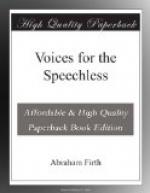We’ve traversed the
desert, we’ve traversed the sea,
And we’ve trod on the
heights where the eagles be;
Seen Tartar, and Arab, and
swart Hindoo;
(How thou pull’dst down
the deer in those skies of blue;)
No joy did divide us; no peril
could part
The man from his friend of
the noble heart;
Aye, his friend; for
where, where shall there ever be found
A friend like his resolute,
fond bloodhound?
What, Herod, old hound! dost
remember the day
When I fronted the wolves
like a stag at bay?
When downward they galloped
to where we stood,
Whilst I staggered with fear
in the dark pine wood?
Dost remember their howlings?
their horrible speed?
God, God! how I prayed for
a friend in need!
And—he came!
Ah, ’twas then, my dear Herod, I found
That the best of all friends
was my bold bloodhound.
Men tell us, dear friend,
that the noble hound
Must forever be lost in the
worthless ground:
Yet “Courage,”
“Fidelity,” “Love” (they say),
Bear Man, as on wings,
to his skies away.
Well, Herod—go
tell them whatever may be,
I’ll hope I may ever
be found by thee.
If in sleep,—in
sleep; if with skies around,
Mayst thou follow e’en
thither, my dear bloodhound!
BARRY CORNWALL.
* * * * *
HELVELLYN.
This fine poem was suggested by the affection of a dog, which kept watch over the dead body of its master until found by friends three months afterwards. The young man had lost his way on Helvellyn. Time, 1805.
I climbed the dark brow of
the mighty Helvellyn,
Lakes and mountains
beneath me gleamed misty and wide;
All was still, save by fits,
when the eagle was yelling,
And starting around
me the echoes replied.
On the right, Striden-edge
round the Red-tarn was bending,
And Catchedicam its left verge
was defending,
One huge nameless rock in
the front was ascending,
When I marked
the sad spot where the wanderer had died.
Dark green was that spot ’mid
the brown mountain heather,
Where the Pilgrim
of Nature lay stretched in decay,
Like the corpse of an outcast
abandoned to weather
Till the mountain-winds
wasted the tenantless clay.
Nor yet quite deserted, though
lonely extended,
For, faithful in death, his
mute favorite attended,
The much-loved remains of
her master defended,
And chased the
hill-fox and the raven away.
How long didst thou think
that his silence was slumber?
When the wind
waved his garment, how oft didst thou start?
How many long days and long
weeks didst thou number,
Ere he faded before
thee, the friend of thy heart?
And, oh! was it meet, that—no
requiem read o’er him—
No mother to weep, and no
friend to deplore him,
And thou, little guardian,
alone stretched before him—
Unhonored the
Pilgrim from life should depart?




